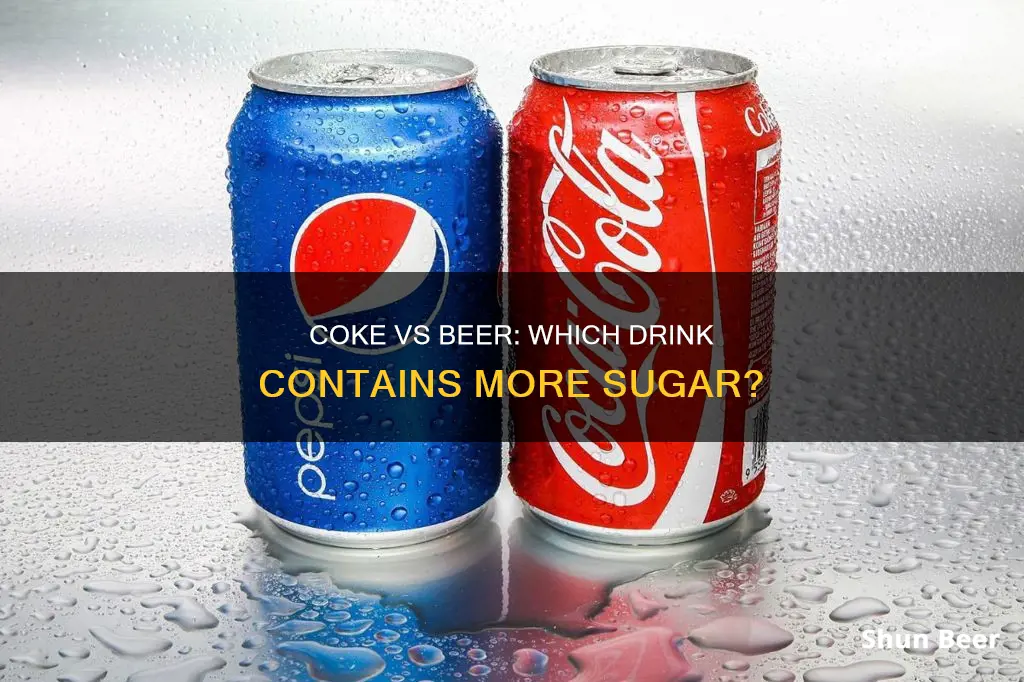
Coke or beer? Which is worse for your health? This is a question that has plagued many, especially those who enjoy a tipple or two. While neither drink can be considered healthy, there are some key differences in terms of their sugar content and overall nutritional value. So, let's delve into the world of beverages and uncover which of these two drinks takes the (wooden) cake when it comes to sugar.
What You'll Learn

Coke has 3-25 times more sugar than beer
Coke and beer are both popular drinks, but which one contains more sugar? A 12-ounce can of standard soda contains about 39 grams of sugar, which is equal to about 9 teaspoons. The American Heart Association (AHA) recommends that women consume no more than 25 grams of sugar per day and men no more than 36 grams. This means that just one can of Coke can easily put you over the recommended daily limit. On the other hand, beer typically has little to no sugar, with a standard 12-ounce serving of regular beer containing around 1 to 2 grams. This means that Coke has around 3 to 25 times more sugar than beer, with the number typically landing at 10 times more.
The reason for the high sugar content in Coke is that it is a sugar-sweetened beverage, with sugar being one of its main ingredients. In addition to sugar, Coke also contains high-fructose corn syrup, carbonated water, caramel colour, citric acid, phosphoric acid, and sodium benzoate. These ingredients give Coke its distinctive taste, colour, and fizziness, but they offer little to no nutritional value. While Coke may provide a quick energy boost due to its high sugar content, it is considered empty calories since it provides no essential nutrients.
Beer, on the other hand, goes through a fermentation process where yeast consumes much of the sugar to produce alcohol. This results in a final product with a relatively low sugar content. Most of the sugar in beer comes from the natural sugars found in the grains used during brewing, and it contributes to the beer's flavour and body. While beer may have a higher calorie count than Coke, it also offers some nutritional benefits. Beer contains trace amounts of protein, potassium, and antioxidants, and it can provide some health benefits when consumed in moderation.
In terms of overall health impact, both drinks have their drawbacks and should be consumed in moderation. However, when it comes to sugar content, Coke has significantly more sugar than beer. With up to 25 times more sugar in a can of Coke compared to a standard beer, it is clear that Coke contributes much more to your daily sugar intake. This can have negative health consequences, as regularly consuming high levels of added sugar increases the risk of higher blood pressure, inflammation, weight gain, diabetes, and fatty liver disease. Therefore, if you are looking to reduce your sugar intake, choosing beer over Coke may be a better option.
Sweetening Carbonated Beer: Sugar Quantity for 16 Oz
You may want to see also

Coke has no nutritional value
The high fructose corn syrup found in Coke is one of the worst forms of sugar. It is a cheap sweetener made from corn syrup that has been processed to increase its fructose content. This is used in place of healthier sweeteners like sucrose, honey, and maple syrup.
Coke also contains caramel colouring, natural flavours, and caffeine. These ingredients provide flavour and colour, but they do not contribute any nutritional value.
Coke Zero, marketed as a healthier version of the original Coca-Cola Classic, also has zero nutritional value. It is calorie-free but uses artificial sweeteners, which have controversial health effects. Some studies suggest that artificial sweeteners may contribute to the development of obesity and metabolic syndrome.
While Coke may provide a quick energy boost due to its high sugar content, it does not provide any long-term nutritional benefits. It is considered a non-nutritious product, offering empty calories that can lead to weight gain and other health issues.
Beer, on the other hand, has trace amounts of protein, higher potassium content, and antioxidants. Although beer is not a significant source of nutrients compared to other foods or beverages, it does offer some nutritional value, which Coke lacks.
Best Sugar-Free Beers: Enjoy Guilt-Free Sipping
You may want to see also

Beer has a lower glycemic index than Coke
When it comes to sugar content, beer and Coke are vastly different. While Coke contains around 30-39 grams of sugar per 300ml-330ml, beer typically has little to no sugar, with 1.5-9 grams per 300ml-330ml. This means that Coke has approximately 3-25 times as much sugar as beer, with a typical value of 10 times more.
However, the difference in sugar content is not the only factor to consider when comparing the two beverages. Beer and Coke also differ in their nutritional value, calorie content, and overall health impact.
Beer has a strong nutritional advantage over Coke. While Coke provides no vitamins or minerals, beer provides thiamin, riboflavin, niacin, vitamin B-6, folate, and vitamin B-12. Additionally, beer contains trace amounts of protein, potassium, and antioxidants.
In terms of calories, a standard 12-ounce serving of beer contains approximately 100-150 calories, while Coke typically has 140-170 calories in the same serving size. However, it is important to note that the calorie content can vary depending on the specific type of beer.
The glycemic index (GI) is another important factor to consider. The GI measures how quickly a food or beverage causes our blood sugar (glucose) levels to rise, with higher GI values indicating a more rapid increase. Coke has a GI of around 90, while beer has a GI of less than 15. This means that, from an insulin resistance perspective, beer is much better.
While both beer and Coke have their drawbacks and should be consumed in moderation, considering factors like nutritional value, calorie content, and glycemic index can help make more informed choices.
Beer's Sweet Secret: Sugar Content Explored
You may want to see also

Coke can lead to weight gain and diabetes
Coke has a high amount of sugar and no nutritional benefit. Research has shown that the more ounces of sugary beverages a person has each day, the more calories they take in. This is because fluids don't provide the same feeling of fullness or satisfaction as solid foods, so people tend to keep eating even after drinking a high-calorie drink.
Drinking too many sweetened drinks means that the body stores excess energy in the form of fat, so drinking too much soda can play a part in the development of overweight and obesity. Research has shown that being overweight or obese is a risk factor for type 2 diabetes and other conditions.
A review of relevant studies confirmed the relationship between diabetes and beverages sweetened with sugar. One study investigated the diet and health of 91,249 female nurses over 8 years and found a link between a diet with a high glycemic index (GI) and type 2 diabetes. The risk for diabetes was high even after taking into account other known risks and dietary factors. The authors explained that higher blood glucose concentrations from a high load of quick-digesting carbs mean more demand for insulin. This can wear out the pancreas and result in glucose intolerance from the cells, leading to insulin resistance. As Coke has an extremely high GI, it may well contribute to this process.
Additionally, Coke has a glycemic index of around 90, which means it can reduce insulin sensitivity and may lead to weight gain and diabetes. Regular consumption of Coke will reduce insulin sensitivity, which can lead to weight gain and diabetes.
While switching to artificially sweetened or 'diet' soda may not reduce the risk of diabetes, it is important to note that research on these beverages has reached varied conclusions. Some studies have found that artificially sweetened low-calorie beverages can help with weight loss, while others suggest that they can affect the mechanisms that lead to diabetes in different ways. For example, one potentially harmful effect of artificially sweetened beverages on glycemic control for people who already have diabetes is that the artificial sweeteners are roughly 200 times sweeter than sugar. This extra sweetness then tricks the brain into reducing blood glucose levels, running the risk of hypoglycemia.
Best Low-Sugar Beers: The Sweetness Spectrum
You may want to see also

Beer has trace amounts of protein, potassium and antioxidants
A common question arises when considering beverage options: which is the healthier choice between beer and coke? While both drinks have their own unique characteristics, one aspect often overlooked is the presence of specific nutrients in beer that set it apart from coke. In particular, beer contains trace amounts of protein, potassium, and antioxidants, offering some potential health benefits that are absent in coke.
Beer is often associated with a moderate source of protein, which is an essential macronutrient for our bodies. This protein content is derived from the grains used in the brewing process, such as barley and wheat. Although the amount of protein in beer is relatively small compared to dedicated protein sources like meat or legumes, it can still contribute to our daily intake. For example, a 12-ounce serving of beer typically provides around 1-2 grams of protein. This might not seem significant, but it can add up, especially for those who consume beer regularly.
In addition to protein, beer also contains potassium, a vital mineral that plays multiple essential roles in our bodies. Potassium is crucial for maintaining healthy nerve and muscle function, including a regular heart rhythm. It also helps regulate fluid balance and blood pressure. The amount of potassium in beer can vary depending on the type and brewing process, but on average, a 12-ounce serving can provide around 50-150 mg of potassium. While this might not be a substantial amount compared to potassium-rich foods like bananas or potatoes, it can still contribute to your daily intake, especially when consumed as part of a balanced diet.
Lastly, beer contains antioxidants, which are beneficial compounds that help protect our bodies from the damaging effects of free radicals. Free radicals are unstable molecules that can build up in our bodies due to various factors, such as environmental toxins, stress, or a poor diet. They have been implicated in the development of various health conditions, including heart disease and certain types of cancer. The antioxidants in beer come primarily from the hops used during brewing. Hops contain compounds known as polyphenols, which have potent antioxidant properties. These antioxidants can help neutralize free radicals in our bodies, potentially reducing the risk of chronic diseases. Additionally, research suggests that moderate consumption of beer (in contexts where alcohol consumption is deemed appropriate) may increase antioxidant capacity in the body, further contributing to its potential health benefits.
Sugar Secrets: Priming Beer with Precise Sugar Grams
You may want to see also
Frequently asked questions
Coke has much more sugar than beer. Coke and most other soft drinks are around 10–12% sugar, which is about 30–36g in 300ml. Beer, on the other hand, has little to no sugar, typically 0.5–3% (1.5–9g per 300ml).
Beer has a strong advantage over Coke nutritionally. Beer has no fat and no sugar. It also has fewer calories and carbohydrates. Beer also provides more minerals and vitamins, including thiamin, riboflavin, niacin, vitamin B-6, follate, and vitamin B-12.
While beer has little to no sugar, other alcoholic drinks can be loaded with sugar. For example, a Vodka & Cranberry has 60% of your daily sugar intake. Clear liquors like vodka, tequila, and gin are the lowest in sugar.







